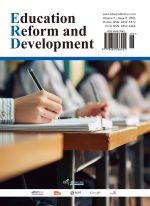Abstract
With the revival of traditional culture, courses on tea culture and tea art have become popular in higher vocational colleges, posing challenges to teaching materials. However, current teaching materials for tea culture and tea art in higher vocational education still have problems such as disconnection from job requirements, an imperfect curriculum system, insufficient attention to skill competitions, and inconsistent certificate standards. To address these issues, teachers can start from three aspects: (1) follow the reconstruction principles based on courses, oriented towards employment, with certificates as the standard and competitions as the direction; (2) adopt strategies such as the organic integration of vocational posts, courses, competitions, and certifications, innovative reconstruction methods, and the construction of supporting resources; (3) form a diverse team. The aim is to improve teaching quality, supply talents to the tea industry, and provide references for the reconstruction of teaching materials for other courses in higher vocational education.
References
Ning Y, 2024, Exploration of the Implementation Path of the Collaborative Education of Aesthetic Education and Labor Education: Taking the “Tea Art and Tea Culture” Course as an Example. Fujian Tea, 46(12): 135–137.
Zheng Y, Jiang L, 2025, Research and Exploration on the Teaching of Live-streaming E-commerce Courses Based on the Integration of “Vocational Posts, Courses, Competitions, and Certifications”. The Science Education Article Collects, 2025(3): 137–140.
Chen Y, Wang R, Ma M, et al., 2024, Integration of Traditional Culture and Ideological and Political Education: Innovation and Practice of Ideological and Political Education in the Tea Art and Tea Culture Major. Guangdong Tea Industry, 2024(6): 57–60.
Liu N, Zhuo J, Lin F, et al., 2025, Curriculum Teaching Reform Based on the Integration of “Vocational Posts, Courses, Competitions, and Certifications”–Taking the Jewelry Appraisal Course as an Example. Ingenuity, 2025(1): 162–165.
Pan J, Chen J, He H, et al., 2025, The Integration of “Cluster Chain, Vocational Posts, Courses, Competitions, and Certifications” Promotes the “Three-Education Reform”, and the “Smart Classroom” Leads the “Classroom Revolution”–Taking “Pig Production Technology” as an Example. Swine Industry Science, 42(1): 48–51.
Wang W, 2025, Promotion of Higher Vocational Students’ Learning Ability: The Integration of “Vocational Posts, Courses, Competitions, and Certifications”, Peripheral Participation, and Learning Transfer. Exploration of Higher Vocational Education, 24(1): 74–80.
Chen W, Zhang Q, 2024, Exploration of the Training Model for Tea Art Talents from the Perspective of Competency-Based Education–Research on the “Three-Integration” Model for Training Tea Art Talents in Higher Vocational Education. Journal of Hubei Normal University (Philosophy and Social Sciences Edition), 44(5): 77–85.
Li Q, 2024, Practice and Exploration of Ideological and Political Education in the “Chinese Tea Art” Course in the New Era. Industrial & Science Tribune, 23(14): 139–141.
Yao L, Zou W, Hu W, 2025, Exploration on the Construction of Professional Curriculum Systems in Higher Vocational Colleges Based on the Deep Integration of “Teaching” and “Educating People”. Modern Vocational Education, 2025(5): 61–64.
Chen M, 2025, Exploration and Practice of the “Classroom Revolution” Based on the Integrated Reform of Teachers, Teaching Materials, and Teaching Methods–Taking the New Media Marketing Course as an Example. Modern Business Trade Industry, 2025(4): 219–221.
Li Q, Gao W, 2024, Reflections on the Reform of the “College Chinese” Textbook in Higher Vocational Colleges Oriented by Professional Literacy. Journal of Sanmenxia Polytechnic, 23(4): 134–140.
Shi L, 2024, Exploration on the Integration of Tea Art Specialist Certificates and Tea Art Courses under the Background of School-Enterprise Cooperation. Fujian Tea, 46(10): 109–111.
Yang L, 2025, Innovative Research on the Talent Training Model of the Tourism Management Major in Higher Vocational Colleges–From the Perspective of the Education Concept of “Integrating Vocational Posts, Courses, Competitions, Certifications, and Ideological and Political Education”. Vocational Technology, 24(2): 40–45.
Liu J, Guo M, Li J, et al., 2024, Reform and Practice of Industrial Engineering Course Textbooks with the Integration of “Artificial Intelligence +” and Digital Resources. Journal of Liaoning Institute of Science and Technology, 26(6): 66–70.
Zhang T, 2024, Research on the Integration Path of Tea Culture Teaching in Serving Rural Revitalization and Promoting the Development of “Three Teas”. Occupation, 2024(16): 82–85.
